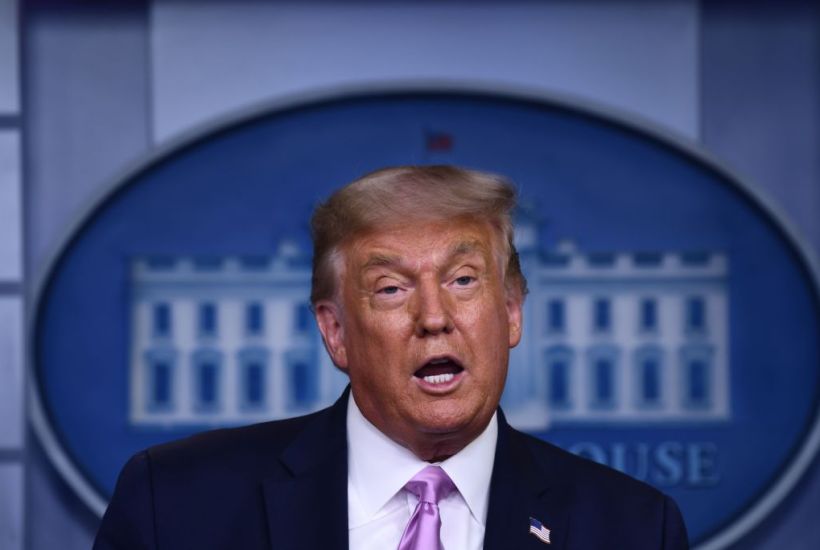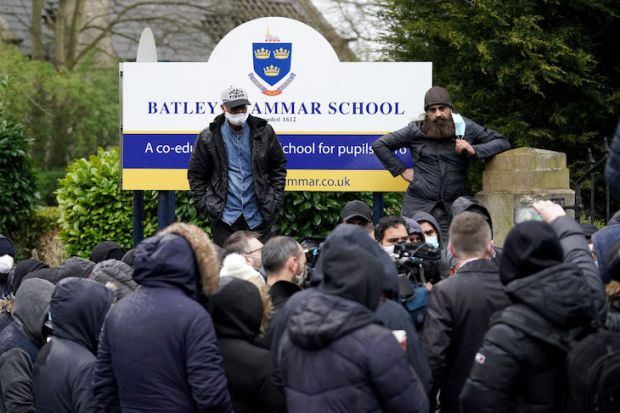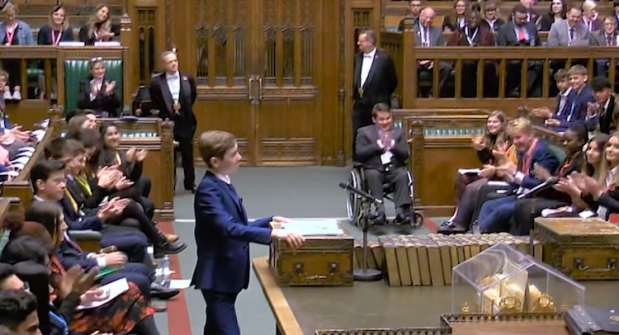Sir Anthony Eden’s wife, Clarissa, famously said that at times she’d felt as if the Suez Canal was flowing through her drawing room. Over the past four years, perhaps American voters have felt the Volga lapping at their feet. There’s been no escape from Russia and even the Mueller inquiry did not put the matter to rest. Before Mueller’s inquiry a year ago, the headlines were about whether President Trump had conspired – or ‘colluded’ – with the Kremlin; the news now is all about Trump’s revenge for what he calls a conspiracy ‘bigger than Watergate’. This Russia conspiracy has the intelligence agencies cooking up a fake story about collusion in order to investigate Trump and overturn the result of the presidential election. In Trumpworld, this all began with a phoney ‘dossier’ from a former British spy.
So expect to hear about Christopher Steele all the way to the US presidential election in November. Trump’s biggest cheerleader in the Senate, Lindsey Graham, has published a declassified summary of the FBI’s interview with the most important contributor to Steele’s dossier. This was his ‘primary sub-source’ who collected information from several other sources. Graham said the summary showed ‘how unsubstantiated and unreliable the Steele dossier was’. Steele’s main source wasn’t ‘some well-connected… Russian official’ but a researcher paid by him to go to Moscow and who got ‘second and third-hand information and rumour at best’. Even then, Graham said, this source ‘did not know where some of the information attributed to him… came from’. It didn’t take long for the internet to figure out that the ‘primary sub-source’ was a Russian analyst at the Brookings Institution in Washington DC, Igor – or Iggy – Danchenko.
Danchenko had been arrested for public drunkenness, according to a court filing. Or as one pro-Trump website put it, he was a Russian national whose past included personal baggage. But this is being either prissy or disingenuous. An intelligence source with ‘personal baggage’?! ‘I am shocked, shocked to find that gambling is going on in here’ (as the police chief in Casablanca says while closing down Bogart’s casino). It is also unfair to Danchenko, who was a gifted researcher. His boss at Brookings, Fiona Hill, says in her biography of Vladimir Putin that Danchenko ‘gained notoriety’ as the only person to get hold of Putin’s doctoral thesis, finding that large parts had been plagiarised from a University of Pittsburgh textbook. Steele likes to show friends the page from Hill’s book where she writes about ‘Igor’s remarkable ability to locate sources and material that other researchers considered totally inaccessible’. Did Steele put things in the dossier that Danchenko never said? The inspector general at the Department of Justice, Michael Horowitz, made that accusation when he released his report into ‘Crossfire Hurricane’, the FBI’s collusion inquiry. But he later published a correction: Danchenko had told the FBI he ‘couldn’t recall’ saying some things to Steele, rather than denying he’d said them – an important distinction.
Steele’s friends say he felt burned by Horowitz, having spent several days being interviewed in London for his report. I’m told he thinks Horowitz had to ‘throw some red meat’ to Trump and the attorney general, Bill Barr, picking out the most damaging things Danchenko had to say about the dossier. It’s true that Steele did not speak to anyone in Moscow himself and, as any journalist knows, a story’s reliability may have a short half-life as it is passes along a chain. But then, many of the people quoted by Steele would not have spoken at all if they’d known these were not private conversations. That may be true of the dossier’s most infamous allegation, strongly denied by Donald Trump. This is the story that the Kremlin has a tape of Trump watching prostitutes urinate on the bed in his suite at the Ritz-Carlton hotel in Moscow.
I happened to be one of the first journalists to hear this story. In October 2016, I was in Washington DC and getting strange reports that the FBI was investigating the Trump campaign. I asked one contact what he thought and he came over to the BBC bureau, where I was working. It was lunchtime and we took tuna sandwiches to an unused studio to eat and talk privately. A sheaf of papers was produced from a black briefcase. ‘I don’t know what you’d even be able to do with this…’ My informant trailed off. There were a dozen pages from what would later be called ‘the dossier’, the most consequential piece of opposition research in American political history. I blinked at certain phrases that jumped out: ‘Trump’s personal obsessions and sexual perversions’; ‘defiling the bed’; ‘employing a number of prostitutes’; ‘golden showers’.
The page in my hand said this story came from ‘Source D’, a ‘close associate of Trump who had organized and managed his recent trips to Moscow’. Source D had ‘been present’ for Trump’s ‘perverted conduct’ in Moscow, if not actually a witness to it. The identity of Source D was later reported to be Sergei Millian, a Belarusian-American businessman who, among other things, sold condos for Trump to rich Russians. Once the dossier detonated publicly – put online by Buzzfeed – Millian ran for cover, telling Russian TV he didn’t have any ‘compromising information’ on Trump. He denied being a source for the dossier at all. That wasn’t surprising but Steele must have had a sickening feeling as Danchenko did the same. He told the FBI he’d never even met ‘Source D’, Millian. He’d tried to meet him but it hadn’t worked out. An unidentified Russian who might have been Millian had rung up but, even then, this anonymous source didn’t say anything damaging about Trump.
If that is true, then Lindsey Graham is right: the dossier is a bad joke, invention masquerading as ‘intelligence’. But I’m told that in 2016 Danchenko gave Steele accounts of three meetings with Millian, as they happened, at restaurants in Washington DC, New York and Charleston. Steele called Danchenko his ‘head agent’ in the field. There was back and forth between them about these meetings. A lot of details were given afterwards. Either Danchenko was producing Pulitzer-prize-winning fiction for Steele or he later felt he had to be extremely careful with what he told the FBI. Steele’s supporters believe this is what happened. You can certainly imagine Danchenko’s state of mind, a Russian in the United States, terrified of being arrested and deported, trying to downplay his role in finding dirt on America’s new president. Time and again, he ‘could not recall’ something quoted in the dossier.
Steele has five other sources for the ‘golden showers’ story. One is the hotel manager, another a maid. Neither had first-hand information, the manager agreed it might have happened, the maid relayed gossip among the housekeeping staff. One is ‘an American’ who supposedly saw a row in the hotel reception about whether a group of prostitutes could go up to Trump’s suite. This American is not Keith Schiller, Trump’s bodyguard, who told a Congressional committee he had ‘stopped’ five prostitutes from trying to visit Trump. Another source was a friend of Danchenko, described as a Russian with a ‘wide social network’, who said the story was common knowledge around the Kremlin. Finally, there was another Danchenko contact, a ‘former senior intelligence officer now a Kremlin official’. This was later said to be no less than a former head of Russia’s foreign intelligence services. This source did not talk specifically about the ‘pee tape’ but, Danchenko told Steele, he said they had sexual kompromat on Trump going back years. ‘We’ve got him over a barrel.’
Since then, I’m told that Steele has had ‘new reporting’ about another Trump sexual encounter in the Ritz Carlton: just one woman this time, it’s claimed, allegedly there the evening after the supposed bevy of urinating hookers. Like many other journalists, I have tried to get at the truth of the ‘pee tape’ story. I found three sources, all claiming to have seen a Trump sex tape. One is a former US intelligence officer, who said a senior official in eastern Europe had shown him stills from ‘one of the tapes’. The second source is in one of Russia’s most feared mafia groups, who said they were the ones who had filmed Trump. He said the gang’s leader joked about Trump to Putin: ‘I gave you that putuch’ – Russian criminal slang for the ‘bottom’ in prison sex. The third is a former colonel in Russia’s intelligence services. He described the Kremlin elite gathering in a villa outside Moscow to watch the ‘pee tape’, tears of laughter streaking their faces. ‘That is our candidate for President of the United States!’
These different sources might be saying the same thing because the story is true – or because of a clever disinformation campaign by the Kremlin. Danchenko’s old boss at Brookings, Fiona Hill, told a Congressional committee that Steele had been ‘played’ by the Russians. I’m told that he now believes we may never know the exact details of what happened behind the closed doors of Trump’s suite at the Ritz Carlton. But he is apparently convinced that the Russians have sexual kompromat of some kind on Trump, enough to blackmail him. Steele had ‘20 to 30’ sources for the dossier and in two decades as a professional intelligence officer he had never seen such complete agreement by such a wide range of sources. He thinks it impossible the Kremlin could get so many people to lie so convincingly. He tells his friends and supporters that the dossier was a ‘damn good’ piece of intelligence work that will be vindicated.
Steele was first to warn that Russia was mounting a covert operation to elect Donald Trump. Fusion GPS – his partners in Washington DC – have called this the dossier’s ‘foundational initial assertion’ and it was correct. Much later, the Mueller inquiry would state that ‘the Russian government perceived it would benefit from a Trump presidency and worked to secure that outcome.’ Steele wrote about what was happening as early as June 2016, his investigation costing a grand total of $169,000 (£130,000). The US intelligence agencies – annual budget, $63 billion (£48 billion) – did not publish their findings until December 2016, too late to prevent the effort to influence the election.
Steele has issued similar warnings about Britain. He told the inquiry on Russia by the Parliamentary Intelligence and Security Committee that the Kremlin had tried to interfere in the Brexit referendum. He said there had been disagreements within the Russian government about this, the effort stopping and starting according to who was winning the argument. I’m told this was based on information from Steele’s confidential sources and is part of a classified appendix to the Committee’s report. But the rest of his submission is public and can be found on his company’s website. It’s worth reading in full.
Steele writes that the Kremlin has ‘an obsession’ with the UK. ‘Putin and his cronies have a love-hate relationship with Britain. They firmly believe that if they can bully, embarrass and humiliate the UK, this will cow others in Europe and elsewhere to tolerate, and in some cases further, their corrupt and amoral agenda.’ This agenda consists largely consists of measures to allow a ‘corrupt political elite… to protect its ill-gotten gains’ but also – as he said in the Trump dossier – to divide and weaken the West. He believes that Russia has become a ‘powerful rogue state’ with a growing appetite for ‘asymmetric warfare: hacking, fake news, infrastructure attacks and the corruption of national politics through dirty money’. He says: ‘The failure of the West… to deter the regime has allowed this to happen.’ If so, little has changed since 2016, when Steele wrote his dossier.
Got something to add? Join the discussion and comment below.
Get 10 issues for just $10
Subscribe to The Spectator Australia today for the next 10 magazine issues, plus full online access, for just $10.




















Comments
Don't miss out
Join the conversation with other Spectator Australia readers. Subscribe to leave a comment.
SUBSCRIBEAlready a subscriber? Log in